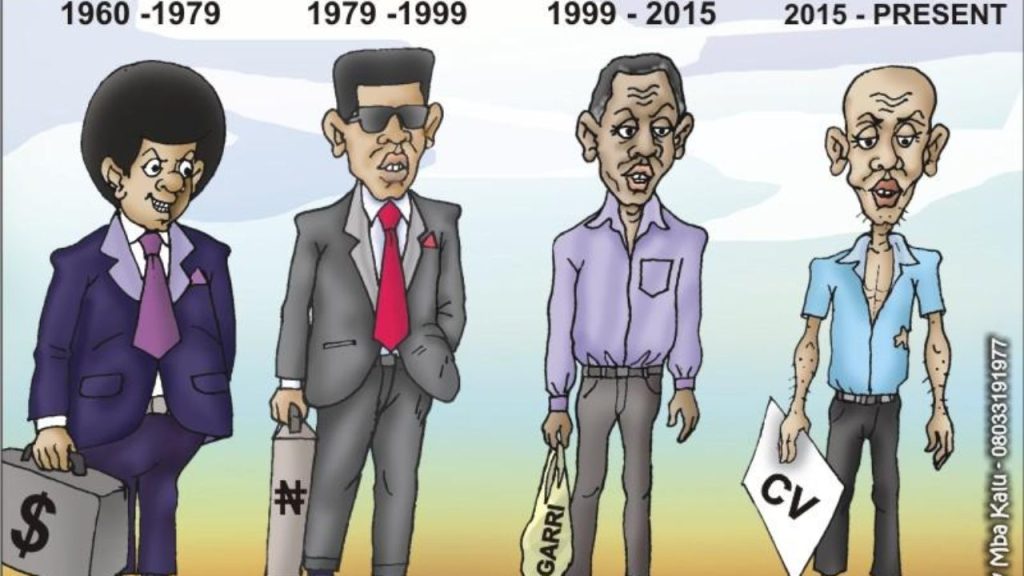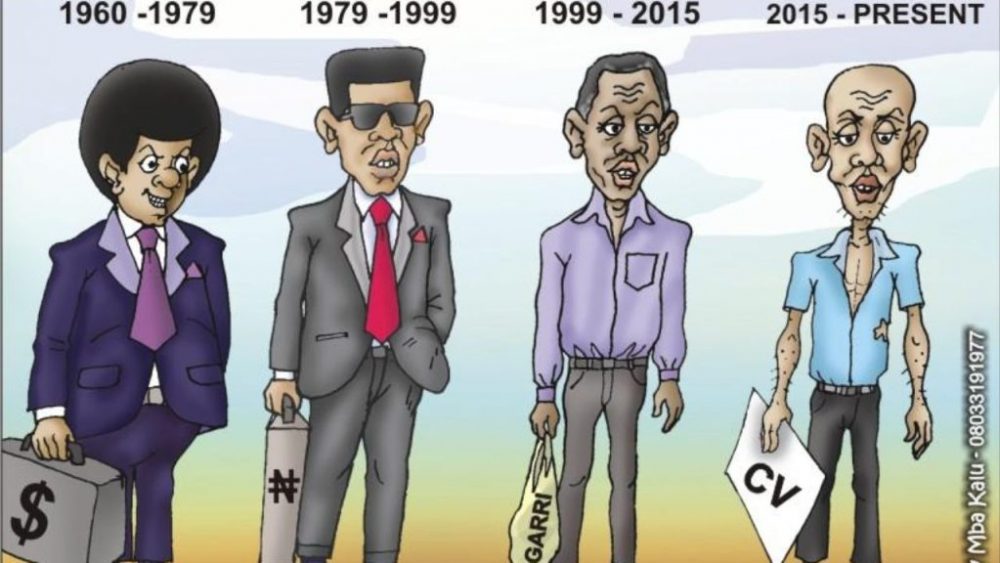
By Otobong Inieke
Capitalism and its fraying edges should be discarded. Its presence grows dull and boring even though millions of Africans experience capitalism in its most vicious expressions; maybe this is why there is a kind of passiveness to its observation or critique. It is often the most affected, the most harmed, and the most vulnerable, that move to educate whoever will listen about the contradictions staring everyone in the face and how to resist and change the status-quo. With the Nigerian, and by extension, the African middle-class in mind, it is vital to note the subtle complicity to neoliberalism within our societies. The economic class that benefited from the Nigerian Oil boom of the ‘70s, combined with the older landed gentry who gained economic power through the height of colonialism in 19th century Nigeria, are the bane of today’s middle-class.
Leaving aside the massive betrayal of the public in the form of natural resource extraction and environmental destruction, the people themselves have been dealt heavy damage in terms of interaction with an entity claiming to represent public interest. For example, the Nigerian National Petroleum Corporation (NNPC) recently revamped its operational structure, transforming from a ‘parastatal’ to a ‘commercial liability company’. With a passive logo re-brand ad campaign announcing this move, and vocal backlash in the form of deafening silence, the federal government only hustled to the media trying to convince the public that the institution had not been effectively privatized. More concerned with being labelled as ‘Africa’s largest national oil company to date’, reports show the NNPC ‘celebrating its relaunch as a limited company and a new found sense of independence’. Still the middle-class un-/willfully middle-manages every drop of class analysis away from the attention and critique of vulnerable poor and working class of which they make up a majority. This is a contradiction too serious to ignore.
The power sector is not exempt from the same attacks, but owing to the critical nature of the industry, the slightest worker action seems to discipline the overseers. For instance, the National Union of Electricity Employees (NUEE) sent a strike warning to the federal government over the planned sale of the Transmission Company of Nigeria (TCN), calling the move a ‘national security risk’ and referring to the private interests as ‘harvestors’. For context, the National Electric Power Authority was firstly systematically unraveled with the Electric Power Sector Reform Act of 2005, where the power utility company was broken into 18 power generation and distribution companies. TCN is this context, being responsible for transmission of power, was the only representation of National involvement in public electricity utility in Nigeria. The decision to move on its sale is another betrayal. But in a stance defiance, the NUEE through its general secretary stated, “Besides, the plan to further enslave Nigerians based on hemlock prescriptions of the IMF, World Bank and Bretton Woods institutions will meet the resistance of the masses and workers of Nigeria, who lost their jobs in thousands, some without pay and Nigerians who have been paying for darkness with the over 400 percent tariff increase for services not rendered.
“With the non-implementation of the agreements reached with Labour eight years after, worsening power supply situation, exploitative tariff imposition on toiling people of Nigeria, and projected 200 percent increase in tariff in the first year of TCN privatization, the struggle will be between the oppressors and the oppressed.” What followed was a just concluded strike action that saw downing of tools, and wide protests at TCN offices, actions that resulted in a 500mW reduction in total power productions 4,688mW, a definite win for worker action and a sure slight to vulture capitalists. This is also a sign that an instinct to organize for justice and against oppression not absent in atrophy, which, like embers of a flame, can die off or spark anew.
Unfortunately, the most glaring is the attack on the education sector, and by extension any institutional attempt at intellectual growth or a healthy collective consciousness. From curriculum cuts to privatization of institutions, students have been under odious pressure in the form of poor infrastructure, bribery, and lack of resources or any real state support. This came to a strike launched by the Academic Staff Union of Universities (ASUU) since February 2022. With a backdrop of an ongoing strike, and thousands of students out of school, the federal government vindictively moved to register two new parallel unions in the education sector essentially applying a divide-and-conquer tactic against the country’s largest academic union. These two unions, the National Association of Medical and Dental Academics (NAMDA) and the Congress of Nigerian University Academics (CONUA), would mostly consist of complicit petty bourgeoisie who once again side with oppressors. While there is the need to also understand the internal contradictions of ASUU, the crippling effect of the government’s move must be confronted.
The current political landscape shows the makings of a middle-class that seems to remember its options during times of collective discontent. Owing to renewed awareness of the political power wielded by the masses, many Nigerians are using the opportunity to understand the workings of a parasitic capitalist economy that has been working against them through the veneer of ‘bad governance’. The problem is capitalism but there is much effort, especially through the complicit mainstream media, to dilute the discourse at poor leadership alone. Proper and principled organizing can be of use here to breakthrough the programming and socialization of subconscious support for neoliberalism. Similar to the #ENDSARS agitations, thousands around the country are taking to the streets in lament of poor social conditions and in demand of economic improvement. But unlike the #ENDSARS actions, the people now have the willingness to understand the wider implications of the problems ailing the country. With cutting edge revolutionary pan-African political education, the Nigerian middle-class will be reignited for a new era as a free, proud, and productive Africans.
As the arch-ministers of capitalism are running out of tricks, the dominance of North-Atlantic imperialism is showing cracks across various regions. There are many protests against foreign militaries e.g. against the French in Mali, Niger and Burkina Faso, and against the UN ‘peace-force’ in DRC, among others. There is also the wave of anti-imperialism in South America meaning the poor and working people are more and more aware of the need for fundamental change in the face of injustice and exploitation. The Nigerian working class is primed to contribute to the international struggle against capitalism, imperialism, and neocolonialism, if only they wake from slumber and remember they are not disarmed, but wield the most potent force in history: people power. The revolutionary working people of Cuba, Zimbabwe, Haiti, Venezuela, Nicaragua, Iran, Ireland and others all stand as examples of resisting neocolonialism. The Nigerian working class must connect these dots as it has in the past, because capitalism and its fraying edges should be discarded, its vicious presence grows dull and boring.

